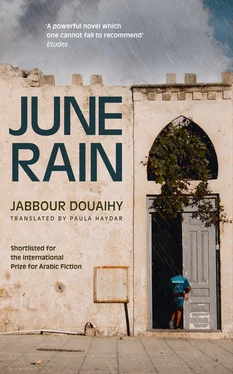The silence returned along with the exchange of glances. Only essential words were uttered. Kamileh shivered as the cold night air rose up from the river. The humidity from the river made sitting on the balcony difficult even on August nights.
‘Take her inside,’ Butros al-Rami said.
Kamileh protested again and suddenly it went dark. There was no light on the balcony or around the whole town.
‘That’s all we need, the electricity to go out…’ her mother said in the dark.
Silence… and night… and humidity.
Her mother started up again. She whispered long pleas into her ear. Kamileh agreed to go inside the house. Maybe she convinced her that in the darkness she wouldn’t be able to see anything in the bedroom.
Muntaha sat alone, exhausted. A little while later Butros al-Rami came back onto the balcony. He stood peering into the dark. A few minutes later Kamileh’s mother also came out. The three of them peered into the dark. Some scattered little lights shone from across the way where it appeared the electricity hadn’t gone out — other lives in those villages spread about the mountainside.
Kamileh stayed with Fuad al-Rami for more than an hour. The two of them, alone inside. Kamileh’s mother would never tell anyone about this visit. Butros and Fuad al-Rami would never tell anyone. Only Muntaha would have difficulty keeping the secret. She would try very hard.
Butros, Muntaha, and Kamileh’s mother waited for Kamileh and Fuad in the dark out on the balcony. Suddenly the electricity came back on and Fuad al-Rami came outside. That was between the hours of ten and eleven o’clock on that Monday night, the 18th of June, 1957.
Muntaha accompanied them on the way back. She walked ahead of them. They kept their guns drawn the whole way, and when they reached the school they tucked them back at their waists and asked her to go back home.
‘Many people will die, Muntaha,’ Fuad al-Rami said.
‘Yusef al-Kfoury was dearer than a brother to us!’ Butros said.
Then they continued on their way up to their quarter, the two of them looking all around in the dark.
We were standing in a long, winding line in front of the army barracks at Qubbah. It was a two-story French structure of sandstone with a lightning conductor on the roof that had a Lebanese flag attached to it. There were three stern-faced soldiers — two with twisted moustaches and one wearing thin glasses — keeping us in order.
We could see the people at the front of the line passing one by one into a small house across from the main barracks building. There was a guard standing ready at the door, not moving an inch, as though he had been painted there.
We didn’t see the ones who went inside come back out after completing the transaction they’d come for. It was as if that small two-room house were steadily swallowing up a long rope of Barqa citizens. Most likely they were exiting through another door, one on the other side which I couldn’t see from where I was edging slowly forward.
There was a man from my family standing behind me whose brother had been killed in the Burj al-Hawa incident. His name was Hilal, but they nicknamed him ‘ al-Ghandour ’ — ‘the Dandy’ — for reasons I never thought to inquire about. His brother who had died in the incident was called Nassif. He kept talking in my ear, practically non-stop since the time we arrived, and the first thing on my mind was to get free of him. And so I offered to let him cut in front of me, but he refused.
One by one the late-comers joined the end of the line that reached all the way to the main road, back behind the statue of the Unknown Soldier at the main entrance to the barracks. It was a stone statue of a military fighter brandishing a flag, and beside it there was a plaque with the names of those who had fallen in the line of duty. Whoever had etched the names in the plaque didn’t list them in alphabetical order or in chronological order of their deaths. Instead, he’d tried to the best of his ability to deliberately alternate each Christian name with a Muslim name: First Adjutant Butros Mansour Saba, Sergeant Mahmoud Ismail al-Qaafarani, Private First Class Mousa Jibrail Touma, Private Mustafa al-Asaad, and so on. There were more Muslims than Christians, however, so he was forced to put three Muslim names in a row at the end of the list.
I had come on my own, and my brother had done the same. We hadn’t wanted to draw attention by arriving together. He was a few metres ahead of me in the queue. That’s how we were with everything — he beat me at doing, while I beat him at thinking. I noticed our uncle’s wife at the front of the queue, too, ahead of my brother. She was ahead of both of us, which, in my opinion, she deserved to be. She had left early for the barracks. I tried to avoid her eyes. As she scanned the crowd in all directions she was undoubtedly searching for us — for my brother and me. She didn’t see me, though, and in fact she would enter the small building and exit through the back door without ever seeing me. That’s how I preferred things to go — each one to his own.
A fat woman dressed in black was standing right in front of me. I didn’t know her. I’d never seen her before in our quarter, and she was definitely not one of our relatives. All of the women standing in line were wearing black. All black. And it was possible to determine how closely they were related to the dead by the heavy black stockings they were wearing in that hot weather, and by the scarves on their heads, too. Bare legs meant a relation of lesser degree or possibly that enough time had passed since the death to permit a slackening in mourning signs. My uncle’s wife was dressed in dark black and she also wore a black scarf on her head that covered her hair. She did that in order to be counted among the victims’ widows. Actually, she should have been in reduced mourning since my uncle had been very old and it had been over a year since he’d died.
I craned my neck and spotted a woman at the head of the queue, not four or five people away from the guard at the door to the little building. She was wearing a green dress. She was the only one not wearing black and she was looking all around in bewilderment as if she’d just discovered she was the only woman in that long line not dressed in black. She turned her head looking all the way to the end of the line that extended all the way to the main road. She was the only one wearing colourful clothing. I didn’t think she lived in the town. It was likely that someone had told her to come, so she came. Maybe she’d come from Beirut. I wanted to ask the Ghandour about her but I changed my mind for fear he would start talking my ear off again.
The number of women was equal to, or possibly exceeded, the number of men. All the relatives had come except for the ones who’d gone to Australia to escape the fighting. Those émigrés sent power of attorney to one of their relatives. Kamileh, the wife of Yusef al-Kfoury, hadn’t come down to the barracks. We didn’t realise it at the time. They told us later on that she was the only woman who had refused to come to the Michel Hlayel barracks. She said she didn’t want money in compensation for her husband, insinuating that the rest of us had sold out our dead relatives for money. She had no right to talk that way. People told all sorts of stories about her, that Kamileh. Everyone knew that she’d conceived a child after her husband’s death. More than nine months after. People don’t have anything else to do; they scrutinise, calculate and count on their fingers while waiting for each other around every corner.
The fat lady in front of me was trying to find someone to talk to, anyone. She was nervous. She looked to the front and to the back without seeing a single familiar face. There was no way I could respond or carry on a conversation with her because the Ghandour kept whispering to me from behind almost continually; it was impossible for me to follow two people talking at the same time. The Ghandour stopped just for a second, to take a sniff and try to stop his nose from running. I searched my pocket for a handkerchief to give him to blow his nose, but I didn’t find one, so I thought about tearing off a corner of the paper bag I was holding. He could use it to end the constant threat of his nose dripping once and for all.
Читать дальше












